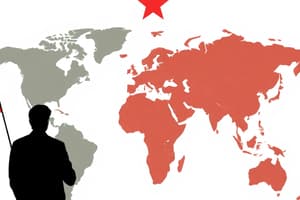Podcast
Questions and Answers
What is the main focus of Comparative Politics?
What is the main focus of Comparative Politics?
- Analysis of political behavior within a single country
- Implementation of government policy
- Examination of political systems across different countries (correct)
- Study of relations between countries
Which term refers to the legitimate power recognized by those being ruled?
Which term refers to the legitimate power recognized by those being ruled?
- Power
- Authority (correct)
- Sovereignty
- State
What characterizes Totalitarianism as a political system?
What characterizes Totalitarianism as a political system?
- Power is exercised through elected representatives
- There is a concentration of power in a leader or elite
- A strong emphasis on individual rights and freedoms
- The state regulates nearly every aspect of public and private life (correct)
Which of the following is NOT a branch of Political Science?
Which of the following is NOT a branch of Political Science?
What is the supreme authority within a territory called?
What is the supreme authority within a territory called?
Which political theorist is known for advocating the concept of a social contract?
Which political theorist is known for advocating the concept of a social contract?
What type of research method involves case studies and interviews?
What type of research method involves case studies and interviews?
Which definition best fits the term 'politics'?
Which definition best fits the term 'politics'?
Flashcards are hidden until you start studying
Study Notes
Definition of Political Science
- Study of politics, government systems, and political behavior.
- Analysis of political activity, thought, and the structure and function of political institutions.
Key Concepts
-
Power:
- Ability to influence or outright control the behavior of people and institutions.
-
Authority:
- Legitimate power recognized by those who are being ruled.
-
State:
- A political entity with defined territory, population, government, and capacity to enter relations with other states.
-
Sovereignty:
- Supreme authority within a territory.
-
Politics:
- The process of making collective decisions and the struggle over power and resources.
Branches of Political Science
-
Comparative Politics:
- Examines and compares political systems across different countries.
-
International Relations:
- Studies relations between countries and the roles of sovereign states, intergovernmental organizations, and non-governmental organizations.
-
Political Theory:
- Explores fundamental ideas such as justice, rights, and the role of the state.
-
Public Administration:
- Focuses on the implementation of government policy and the management of public programs.
-
Public Policy:
- Analysis of the processes by which governments create and implement policies.
Political Systems
-
Democracy:
- System of government where power is vested in the people, exercised either directly or through elected representatives.
-
Authoritarianism:
- Concentration of power in a leader or an elite not constitutionally responsible to the public.
-
Totalitarianism:
- An extreme form of authoritarianism where the state seeks to regulate nearly every aspect of public and private life.
Key Theorists
- Plato: Advocated for philosopher-kings; believed in ideal forms of governance.
- Aristotle: Analyzed various political systems; known as the father of political science.
- Hobbes: Stressed the necessity of a strong central authority to avoid chaos.
- Locke: Emphasized natural rights and the idea of consent of the governed.
- Marx: Critiqued capitalism and proposed a classless society through socialism.
Research Methods
- Qualitative: Case studies, interviews, and observational studies to understand political phenomena.
- Quantitative: Statistical analyses, surveys, and formal modeling to interpret political behavior and trends.
Contemporary Issues in Political Science
- Globalization: Impact on national sovereignty and local political identities.
- Human Rights: Advocacy and protection of rights across cultures and legal frameworks.
- Environmental Politics: Relationship between political actions and environmental sustainability.
- Populism: Rise of movements that prioritize the interests of the 'common people' over elites.
Definition of Political Science
- Political science is the study of politics, government systems, and political behavior.
- It analyzes political activity, thought, and the structure and function of political institutions.
Key Concepts
- Power is the ability to influence or control the behavior of people and institutions.
- Authority is legitimate power, recognized by those being ruled.
- State is a political entity with defined territory, population, government, and the capacity to engage with other states.
- Sovereignty is the supreme authority within a territory.
- Politics is the process of making collective decisions and the struggle over power and resources.
Branches of Political Science
- Comparative Politics examines and compares political systems across different countries.
- International Relations studies relations between countries, including sovereign states, intergovernmental organizations, and non-governmental organizations.
- Political Theory explores fundamental ideas like justice, rights, and the role of the state.
- Public Administration focuses on the implementation of government policy and the management of public programs.
- Public Policy analyzes the processes by which governments create and implement policies.
Political Systems
- Democracy is a system where power is vested in the people, exercised directly or through elected representatives.
- Authoritarianism concentrates power in a leader or elite, not constitutionally responsible to the public.
- Totalitarianism is an extreme form of authoritarianism where the state seeks to regulate nearly every aspect of public and private life.
Key Theorists
- Plato advocated for philosopher-kings and believed in ideal forms of governance.
- Aristotle analyzed various political systems and is known as the father of political science.
- Hobbes stressed the necessity of a strong central authority to avoid chaos.
- Locke emphasized natural rights and the idea of consent of the governed.
- Marx critiqued capitalism and proposed a classless society through socialism.
Research Methods
- Qualitative methods include case studies, interviews, and observational studies to understand political phenomena.
- Quantitative methods include statistical analyses, surveys, and formal modeling to interpret political behavior and trends.
Contemporary Issues in Political Science
- Globalization impacts national sovereignty and local political identities.
- Human Rights are advocated for and protected across cultures and legal frameworks.
- Environmental Politics explores the relationship between political actions and environmental sustainability.
- Populism involves the rise of movements that prioritize the interests of the 'common people' over elites.
Studying That Suits You
Use AI to generate personalized quizzes and flashcards to suit your learning preferences.



